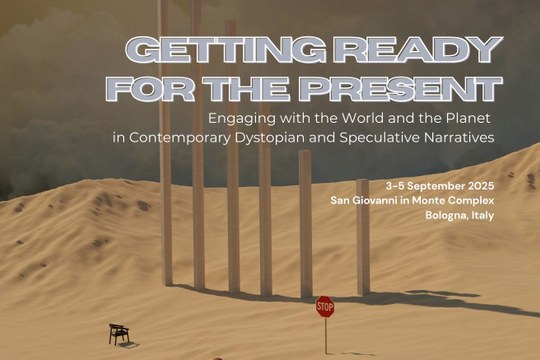
Paola Scrolavezza (P.I. del Progetto PRIN 2022: “Prepararsi al presente: nuovi immaginari distopici globali e impegno pubblico. Dialoghi transculturali e transmediali tra culture giapponese, latino-americana, anglo-americana”)
Elena Lamberti (Vice Direttrice del Dipartimento di Lingue, Letterature e Culture Moderne dell’Università di Bologna)
Claire Mercier, “Metamorphosis and Symbiosis in the Latin American Prospective Narrative of the Last Decade”, Chair: Edoardo Balletta
Alternative Epistemologies
Chair: Valeria Stabile
1. Alan N. Shapiro: A New Alternative to Capitalism
2. Luca Salvi: Predetermination and Ineffectiveness. Notes on the Paralysis of Agency
3. Federica Moscatelli: Rethinking Eco-Catastrophe: Local and Global Perspectives from Latin America
4. Alessandra Vannucci: Observing Some Amerindian Propositions About the End of the World
Collective Resistance and Apocalypses
Chair: Gino Scatasta
1. Beatrice Masi: Apocalypses We Live Through: A Reading of Paul Lynch’s Grace (2020)
2. Miłosz Wojtyna: The Rhetoric of Resilience and Resistance in Contemporary Dystopian TV Series
3. Kanya Viljoen: When ‘I’ Becomes ‘We’: Collective Resistance as Collective Reimagination [ONLINE]
4. Alessia Polatti: From Utopia to Dystopia: The ‘Island’ as a Space of Sociopolitical Estrangement and Liquid Modernity in the Recent Immigration Novel
Time, Memory and Trauma
Chair: Veronica De Pieri
1. Giulia Baselica: From the ‘Noon Universe’ to James Cameron’s Avatar: The Story of a Revelatory Dystopia
2. Maja Vodopivec: How Do the Past, Present, and Future Interact in Post-3.11 Japan? Examining Urban Utopia in the SF Manga Coppelion
3. Maria Varsam: Liminal Existence and the Fantastic in Yōko Ogawa’s Existential Dystopia, The Memory Police
4. Marilena Parlati: Suspended Apocalypse, Traumas of Anticipation, and a Lost Paradise: On the Beach by Nevil Shute (1957)
New Environmental Perspectives
1. Natalija Pop Zarieva and Krste Iliev: Transnational Deep Ecologies: Comparative Eco-Consciousness in Le Guin’s Always Coming Home and Crvenkovska’s The House Above the Waves
2. Klara Machata: Glimpses of Solidarity: Dystopian Urban Environments in South Asian Speculative Short Fiction and Beyond
3. Santiago Alarcón-Tobón: Post-Apocalyptic Submerged Territories: An Ecocritical Reading of El tiempo de en medio (2021) by Enrique Lozano
4. Nafisa Oliveira: From Greenwashing to Machinewashing: Pseudo-Ethics in Sustainability and Artificial Intelligence as Depicted in Dystopian Fiction
Ali Millar, Chair: Rita Monticelli
Reproductive Politics and Utopian/Dystopian Imaginaries in Feminist Speculative Fiction
Chair: Francesco Cattani
1. Raffaella Baccolini:Feminist Science Fiction of the 1970s and 1980s: Shaping Contemporary Reproductive Politics
2. Arianna Preite: Reproductive Justice as Freedom to Not Procreate
3. Chiara Xausa: Reproductive Justice as Climate Justice
Perspectives from Latin America
Chair: Valeria Stabile
1. Alis May Iseppi: Memory, Trauma and Resilience: Dystopian Narratives in Andean Oral Tradition
2. Sofia Ciavarella: Forward to the Past: Gauchoides and Gaucho-Zombis in Argentinian Speculative Fiction
3. Brînduşa Nicolaescu: Cyborg Voices as Hybrid Fictional Palimpsests: Narratives of (Dis)Remembering in Cielos de la tierra by Carmen Boullosa, Mantra by Rodrigo Fresán and Speak by Louisa Hall
Anthropogenic Turn in Japanese Literature
Chair: Anna Specchio
1. Laura Clark: A Cozy Café in an Ecological Disaster: Anticipating Isolation in Yokohama Kaidashi Kikou (1994-2006)
2. María Salvador: Medieval Futures: Augmented Pilgrimage and Virtual Ecologies in Kasuga Mandara
3. Jordi Serrano-Muñoz: Japan Sunk Again: The Anthropogenic Turn in Nihon Chinbotsu: Kibō no Hito
Posthuman Speculative fiction
Chair: Federica Moscatelli
1. Sayantina Dutta: Beyond Human and Machine: The Intersection of Gender, Nature, and AI in Klara and the Sun
2. Bratati Barik: Multiplicity of Apocalypse: A Perspective on Posthuman Studies [ONLINE]
3. Tuğba Aygan: All Animals Are Equal but Human Animals Are ‘More Equal’ in the Anthropo-Scene: Precarious Lives in Stef Smith’s Human Animals
Ayase Maru, Chair: Paola Scrolavezza, Nakayama Mayuko; traduzione: Haruka Arakawa
Transpecies and Ecological Alliances
Chair: Francesco Cattani
1. Imad Adjabi: Beyond the Self: Weird Essentialism and Ecological Entanglement in Speculative Narratives
2. Aparajita Nanda: From Symbiosis to Symbiogenesis: Trans-Species Alliances in Octavia Butler’s Lilith’s Brood
3. Ángela Rivera-Izquierdo: Entangled Becomings: Weirdness and the Reconfiguration of Masculinities in Contemporary Fiction in English
Feminist and Corporeal Representations in Dystopia
Chair: Juan Scassa
1. Asuka Ozumi: Girls in Dystopia: Suzuki Izumi and Torikai Akane
2. Daniela Raspollini: Tear Apart Our Future: The Commodification of Human Bodies in Contemporary Speculative Literature
3. Evangeline Petra Scarpulla: Ecofeminist Imaginings in Novels by Yoko Tawada and Luiza Sauma: Climate Crisis, Migration, and Resistance on Earth and Beyond
4. Natalie Israyy: Parasite as a Technique: Beyond the Metaphoric and Representative Literature [ONLINE]
Mirko Lino, “Anarchy in the UK. Post-Apocalypse and Eco-Horror in Contemporary British Cinema”, Chair: Gino Scatasta
Harada Kazue, "Feminist Failed (Re)productive Futures in Japanese Speculative Fiction", Chair: Anna Specchio
Shape, Design and Architecture in Dystopian Narrative
Chair: Luca Paolo Bruno
1. Madelena Mañetto Quick: Speculative Design for More-Than-Human Worlds
2. María del Pilar Melgarejo: Shapeshifting in Frida Kahlo’s Art
3. Tomasz Dymowski: Qudan Rie’s Dystopian Narrative and Architecture of the Present in Tokyo Sympathy Tower (Tōkyō-to dōjōtō)
AI & Distopian imageries
Chair: Veronica De Pieri
1. Aba-Carina Parlog: The Unhinged Reality: ‘Lifted’ Children, Artificial Friends, and Digital Surrogates [ONLINE]
2. Despoina Tantsiopoulou: Educated Clones: Dystopic Education as Trauma in Kazuo Ishiguro’s Never Let Me Go
3. Maria-Ana Tupan: Suppressing the Past, Undoing the Self
A cura di Paola Scrolavezza, Luca Paolo Bruno, Juan Scassa, Ludovica Pannitto e Valeria Stabile